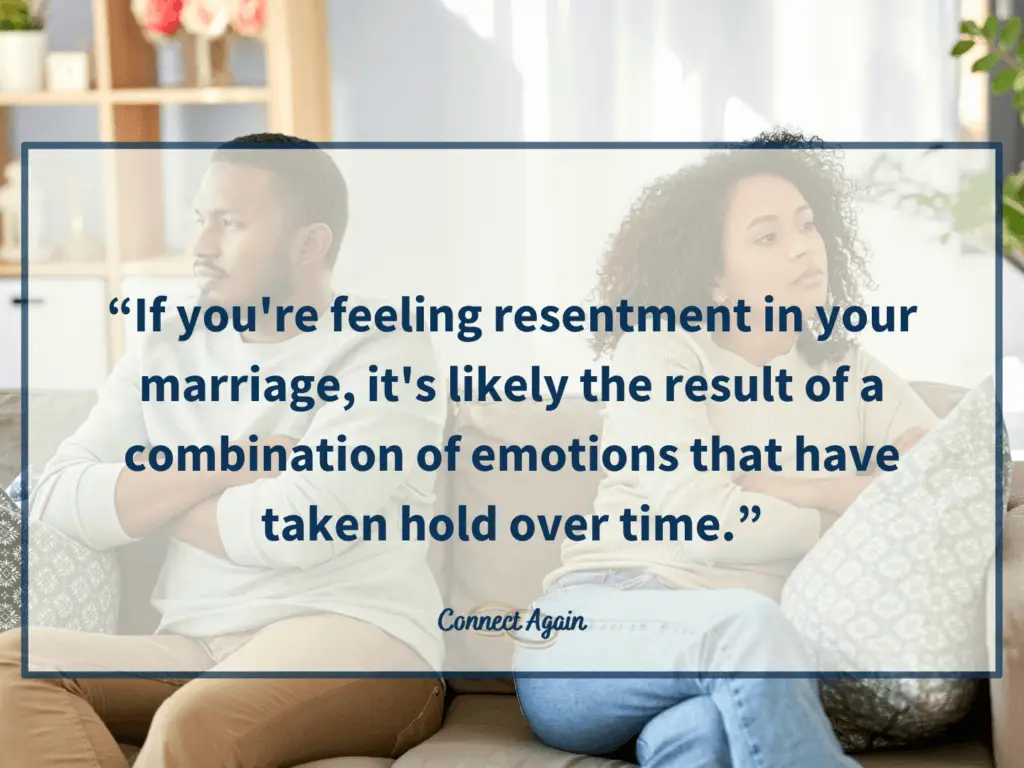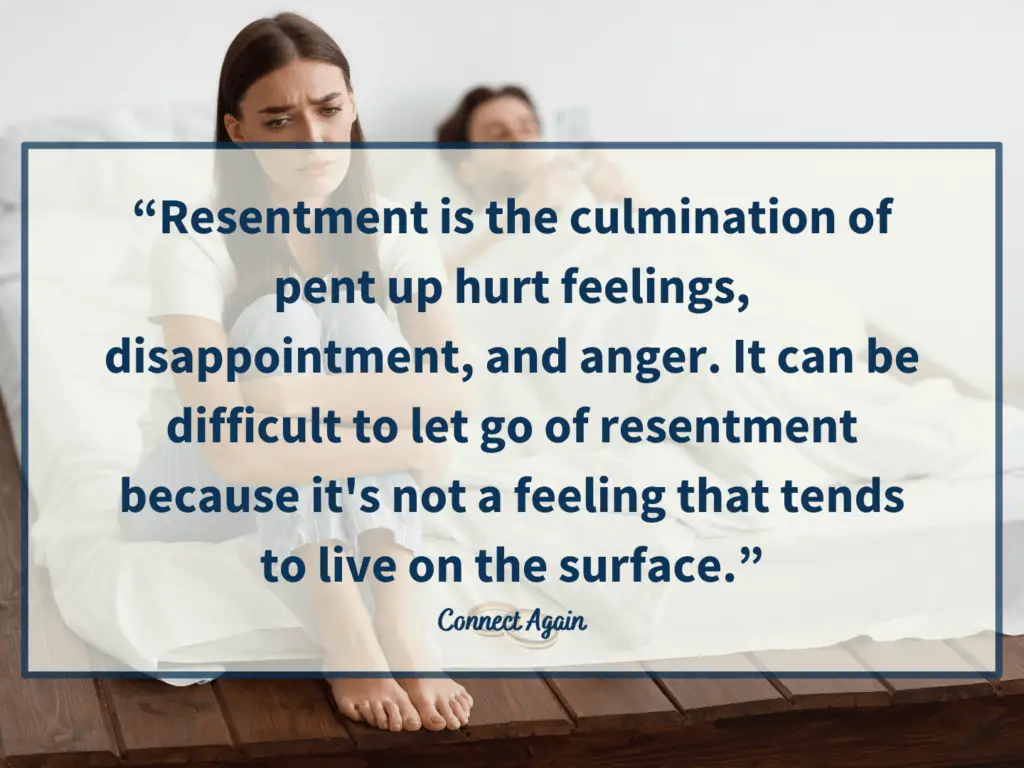Discover crucial steps to let go of resentment towards your husband and rebuild a loving, healthy relationship. Start healing today.

My husband Josh and I have been together for 12 years (8 of them married). We know firsthand how careful you need to be so that resentment doesn’t build in the marriage.
This blog post is partly based on things we personally do in our marriage. I also did research to better understand resentment and how couples can overcome it.
- What does resentment mean?
- What does resentment do to a marriage?
- Stages of resentment
- Signs of resentment in marriage
- Feelings of resentment towards husband: Why wives resent husbands
- How to deal with resentment towards husband
- How to let go of resentment towards your husband
- Can a marriage survive resentment?
- Final thoughts on resentment towards your husband
- Pin for later!
What does resentment mean?
Resentment is the culmination of pent up hurt feelings, disappointment, and anger. It can be difficult to let go of resentment because it’s not a feeling that tends to live on the surface. It usually requires you to reflect and consider your underlying feelings.
What emotion is behind resentment?
There are several emotions behind resentment:
- anger
- disappointment
- bitterness
- hard feelings
- disgust
- disapproval
- sadness
- frustration
If you’re feeling resentment in your marriage, it’s likely a combination of emotions that have taken hold over time.
What is the root of resentment?
The root of resentment often lies in unmet expectations and perceived injustices, where individuals feel undervalued, overlooked, or taken advantage of. This emotional response typically stems from repeated experiences of disappointment, leading to a buildup of negative feelings.
Resentment can also arise from poor communication, where misunderstandings and unresolved conflicts fester over time.
A lack of empathy and validation from others can exacerbate these feelings, as individuals may feel their emotions and needs are ignored.

What does resentment do to a marriage?
Resentment is an underlying issue that can cause a lot of other conflict in a marriage. It can lead to:
- Emotional withdrawal
- Passive aggressive behavior
- Contempt
- Anger
Stages of resentment
Resentment can happen in one of two ways. It can be the result of a past issue that was never truly resolved or it can slowly build up due to day-to-day experiences. Below you’ll find the stages of resentment for each.
It’s important to understand how resentment can grow that you can stop it before it gets to be a much larger issue.
Resentment from a past issue
Here is how resentment takes hold after an incident:
- Something big happens and feelings are hurt
- The incident is either dealt with or not
- Apologies and forgiveness may or may not be given
- You don’t deal with the feelings that resulted from the issue
- You don’t communicate effectively (and maybe your spouse doesn’t either)
- You grow frustrated over time as the feelings remain
- Small things will remind you of the event and the resentment grows
Resentment from day-to-day issues
This kind of resentment slowly builds. It doesn’t happen overnight. Here are the stages:
- Something small happens (a hurtful comment is made)
- You tell yourself that it’s “no big deal”
- You don’t deal with the emotion(s) you felt
- You brush it all off
- Another small thing happens (either the same or something similar)
- Things start to cycle and repeat themselves
- You eventually feel resentful

Signs of resentment in marriage
According to WebMD, there are 7 signs of resentment:
- Recurring negative feelings
- Inability to stop thinking about a particular event
- Feelings of regret or remorse
- Fear or avoidance
- A tense relationship
- Feeling invisible or inadequate
- Inability to let go of anger
What does resentment look like in a marriage?
Resentment in marriage can fall into two very different categories: resentment from a past hurt/issue and resentment from day-to-day issues.
Resentment from a past issue
Almost every couple can think back to a particularly large conflict they had in the past. One person did or said something hurtful. Even if apologies and forgiveness were given, it’s possible the pain from that instance is still lingering.
A painful event in your marriage can lead you to feel resentful towards your spouse. Sometimes without you even realizing it. Small things your spouse does might trigger the pain from that event and lead to your resentment.
Resentment from day-to-day issues
Unmet expectations can cause you to feel resentful. If you expect your husband to help you with the kids when he gets home from work, you can quickly feel resentful when he instead goes for a jog. You had an expectation that you’d be able to take a break and you didn’t get that.
The way your spouse talks to you on a regular basis can also lead to resentment. For example, if your spouse is overly critical, the feeling of resentment can build up as you become more and more frustrated with their actions.
Here are specific examples of how resentment shows up in marriage:
- Getting angry with your spouse over seemingly small things
- Withdrawing from your spouse and preferring to be alone
- Being passive aggressive with your spouse
- An inability to voice concerns due to past hurt feelings

Feelings of resentment towards husband: Why wives resent husbands
Men and women are different. I truly believe a lot of resentment stems from expecting the other person to think or behave in a certain way.
If you’ve been asking yourself “Why do I resent my husband?”, then keep reading for some common reasons.
Resentment towards husband after baby
After you have a baby, your hormones and emotions are heightened. Unfortunately, it can be easy to take it out on your husband and resent him for a number of things (not holding the baby enough, not giving you a break, etc.)
Your family has grown. You and your husband are trying to find your new rhythm and family dynamic. You are bound to be emotional during this time. And that’s ok!
Add in the sleep deprivation that comes with a new baby and it’s a recipe for emotional disaster. Be gentle with yourself and your husband. It’s likely you are both struggling.
Resentment towards husband after kids
Kids require a lot of work, emotionally and physically. If you only focus on what you are doing for the kids, it can be easy to resent your husband for what he is not doing.
It’s the days that I feel spent that I’m more vulnerable to resentment. Keep reading below to see how I stop resentment from happening!
Want to enjoy parenting with your husband? You’ll love these posts!
- How to Stop Saying “I Hate Parenting with My Husband”
- How to Stop Fighting with Your Husband Over Parenting

How to deal with resentment towards husband
Recognize
Resentment is a feeling that lies beneath the surface. It’s much easier to see that you’re frustrated or disconnected with your husband. Reflect and begin to recognize resentment. If you already do recognize it, you’ve already done some of the work.
Recognizing what’s really going on is an important first step. Be proud of yourself for taking steps towards a healthier marriage!
Accept
I’ve been on a journey lately to learn more about emotional regulation. One of the things I’ve learned is that you should accept your feelings. The more you try to deny how you feel, the harder it will be to deal with them and the worse it will all feel.
It’s time to accept this feeling of resentment. It’s ok. It’s just a feeling. What matters now is what you do with that feeling.
Do you let it fester and linger on? Or do you take steps to a healthier marriage?
Work on small steps
If your resentment is coming from a past, hurtful event, you’ll need to take small steps to deal with it. First, consider how well you and your spouse handle conflict resolution. Can you talk to your spouse about smaller issues? If you can’t talk about smaller issues and mistakes, tackling a larger issue is going to be almost impossible.
Focus on bringing small concerns to your husband. Did he say something hurtful this morning? Talk to him about it in a kind, loving, and respectful manner.

How to let go of resentment towards your husband
Identify the root cause
What’s causing you to feel resentment towards your husband? It’s important to figure out why you are having these feelings so you can figure out your next steps.
Did your husband make a big mistake a few months ago? Has the pain been lingering from that incident?
Or have hurt feelings been adding up with small (but hurtful) instances that happen almost daily?
Choose to see the good
Over time, I’ve learned how important mindset is. I made a conscious decision to focus on the good. Not just in my marriage, but in life. I saw improvements in my communication and demeanor towards Josh after making this mindset change.
Why focus on your spouse’s mistakes when you can focus on the good that they’ve done?
I know: it’s easier said than done. Especially if you’re experiencing feelings of resentment. It definitely takes practice to change your mindset. But it’s worth the work!
Work on the emotional intimacy in your marriage
If your marriage lacks emotional intimacy, it can be a lot harder to let go of resentment towards your husband. Here are some things you can do to build emotional intimacy in your marriage:
- Talk about more than just work and the kids
- Make appreciation a habit
- Practice kindness when your spouse shares their thoughts and feelings
- Take care of each other
- Stop and notice what’s going on with your spouse
- Practice deeper listening
Want to learn more? Here are 19 ways to build emotional intimacy in your marriage.

Notice when the feeling comes up
It’s time to start noticing your feelings. Learn to recognize when you are feeling resentful in the moment. Ask yourself these questions:
- What’s going on right now? What events led me to feel this way, in this particular moment?
- Is the resentment I’m feeling a lingering hurt from the past? Or is it a current issue/feeling?
If the resentment is from the past, it can be easy to identify what’s going on. (“I’m still hurt by what you said last week.”)
If the resentment is from the present, you’ll need to dig deeper. Do you have needs that are not being met? (“I haven’t been able to step away from 10 minutes to shower today.”)
If you have unmet needs, it can be easy to feel resentful towards your husband for seemingly simple things. If you haven’t been able to shower today, you might feel resentful towards your husband when he gets home from work and decides to go on a jog. You had an expectation that you’d be able to meet your need.
Communicate your feelings
Your husband can’t read your mind. Let him know how you are feeling. Approach the subject with love and respect so that he will be more likely to hear you.
Learn how to communicate with your husband without fighting. This is something you’ll need to work on over time and doesn’t happen overnight.
If you have communication problems, you’ll want to read this post. It will help you identify what areas you need to work on.
Communicate your needs
If you have unmet needs, the solution is to find a way to meet them. If you need your husband’s help: tell him.
This is a conversation Josh and I have a lot. We check in with each other to see if we can help in any way. A lot of times, the way we can help is by taking the kids and giving the other person a break.
Think about your husband’s feelings
How is your husband feeling? Is there a possibility your husband was rude or made a mistake because something was going on with him? Showing empathy to your husband is a great way to put your own resentful feelings aside.
Josh and I communicate our struggles to each other. Because of that, I can usually figure out what’s going on with him without him telling me. When I put myself in Josh’s shoes, it leads me to empathy and compassion instead of resentment.

Can a marriage survive resentment?
A marriage can survive resentment if you’re willing to put in the work. It takes a lot of self reflection to understand what the root cause of your resentment is.
If you’re not ready for in person couples therapy, I suggest checking out HeyRitual. They’re an online couples counseling app that fits into your schedule. Even better, it cheaper than most other counseling you’ll find online. Read my review and personal experience with HeyRitual here.
Is resentment a reason for divorce?
Resentment is not necessarily a reason for divorce because you can work through it. I’m a firm believer that marriage is for life and you have to fight for each other constantly.
This IS something you can get through.

Final thoughts on resentment towards your husband
Feelings of resentment can fester in a marriage and lead to more issues. Don’t let resentment linger. Aceept your feelings and take steps to work through this tough time.
What steps work for you the best when it comes to letting go of resentment towards your husband? I’d love to hear from you in the comments below!
Pin for later!



About the Author
Melissa is a wife of 8 years and mother to 2 young kiddos. She has a passion for helping couples prioritize and strengthen their marriage after having kids. She knows firsthand how difficult it can be to connect with your spouse when you have little people running around, demanding all of your attention.

